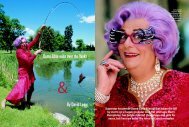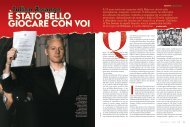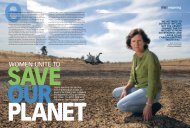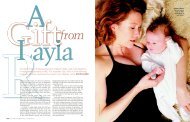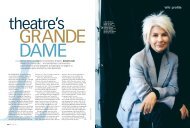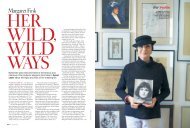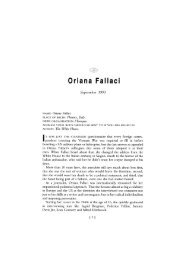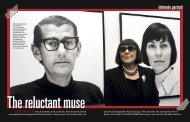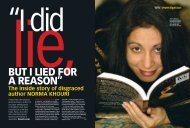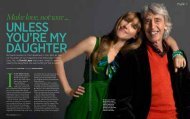Read Article - David Leser
Read Article - David Leser
Read Article - David Leser
Create successful ePaper yourself
Turn your PDF publications into a flip-book with our unique Google optimized e-Paper software.
Malika with water sellers in Djemaa el-Fna, the main square of Morocco’s capital,<br />
Marrakesh. “It is like I have made a long journey and I am coming back,” she says.<br />
family, she feels she can at least start thinking<br />
about the future. She can fulfil her mission by<br />
writing the film script of her life story, then she<br />
can begin learning to live. “My family has only<br />
perceived the success,” she says. “They haven’t<br />
understood what it has cost. Maybe it is too<br />
early for them to understand ... that the only<br />
strength I have is that whatever King Hassan II<br />
did to us, however powerful he was, however<br />
untouchable he was – thanks to Europe which<br />
put him in that position – one woman with<br />
no weapons, no power, nothing, succeeded<br />
in defeating him.<br />
“And so, when the history of Morocco<br />
is written in 40 or 50 years, no historian will<br />
forget to associate the history of King Hassan<br />
II with the drama and tragedy of the Oufkir<br />
family. To me that is the most important thing.<br />
That was my way of survival. That was my way<br />
of being able to avenge my family.”<br />
The flight from Paris takes just under<br />
three hours. For many Moroccans<br />
working in France, away from<br />
family and homeland, it is a joyous<br />
moment, flying over the Pyrenees and<br />
the snow-capped Atlas Mountains, before<br />
touching down at the delightfully ramshackle<br />
Marrakesh airport.<br />
For Malika Oufkir, the emotions are more<br />
complex. This is her third time back since she<br />
was allowed to leave the country in 1996.<br />
Last year, she joined a symbolic march<br />
of activists to Tazmamart, a jail in the Atlas<br />
Mountains where 58 political prisoners were<br />
shut away in small, lightless cells for 18 years.<br />
Half of them died from malnutrition. They<br />
were among the thousands of people who<br />
disappeared during King Hassan’s 38-year<br />
strong-arm reign.<br />
This time, Malika is coming to Morocco<br />
to attend a friend’s wedding. She and her<br />
106 THE AUSTRALIAN WOMEN’S WEEKLY – DECEMBER 2001<br />
husband, Eric, have invited me to join them<br />
for the celebrations, and to witness first-hand<br />
how she is now treated in the country that<br />
once banished her.<br />
Her oppressor, King Hassan II – for<br />
whom, amazingly perhaps, she feels no<br />
hatred – died two years ago and was<br />
succeeded by his son Muhammad VI.<br />
The young king has acknowledged the state’s<br />
role in the torture and abduction of political<br />
opponents and has begun compensating<br />
some of the victims of abuse. The Oufkirs are<br />
still waiting. “Some people were born to live,”<br />
Malika tells me. “Others were born to wait.”<br />
On our arrival in the terracotta-walled<br />
desert city of Marrakesh, we walk towards the<br />
airport exit and Malika says to the customs<br />
officer: “Do I need to declare something?” The<br />
officer looks at her and, grinning broadly, says:<br />
“You need declare nothing. Welcome home.”<br />
Over the next three days and nights,<br />
I watch Malika welcomed “home”. In the<br />
square, where the dusk turns pink and smoky<br />
with the smell of charcoaled meats and hash<br />
joints, and the souks burst with acrobats,<br />
hawkers, beggars and cobras, Malika walks<br />
among her people with the air of someone<br />
just returning from a distant voyage. She<br />
is there, but she is not there. “It is like I<br />
have made a long journey away from the<br />
planet and I am coming back,” she says.<br />
At the wedding the following night, where<br />
hundreds of guests have gathered in tents or<br />
under a sheltering sky, amidst a cacophony<br />
of drum beats, chanting and traditional<br />
Moroccan music, she cuts an elegant but<br />
remote figure.<br />
All night, people brush by her, greet her,<br />
welcome her back, touch her lightly on the<br />
shoulder with a confidence or two. Malika<br />
smiles at them, nods her head and sways her<br />
body to the music. She is there, but she is not<br />
there.<br />
Her friend, Sabah, tells me Malika is a<br />
destroyed woman and that she will never<br />
recover from what has happened. Perhaps<br />
she is right. Perhaps you can never return from<br />
the grave. W<br />
“Some people were born to live,” Malika<br />
tells me. “Others were born to wait.”<br />
PHOTOGRAPHY BY DAVID LESER



